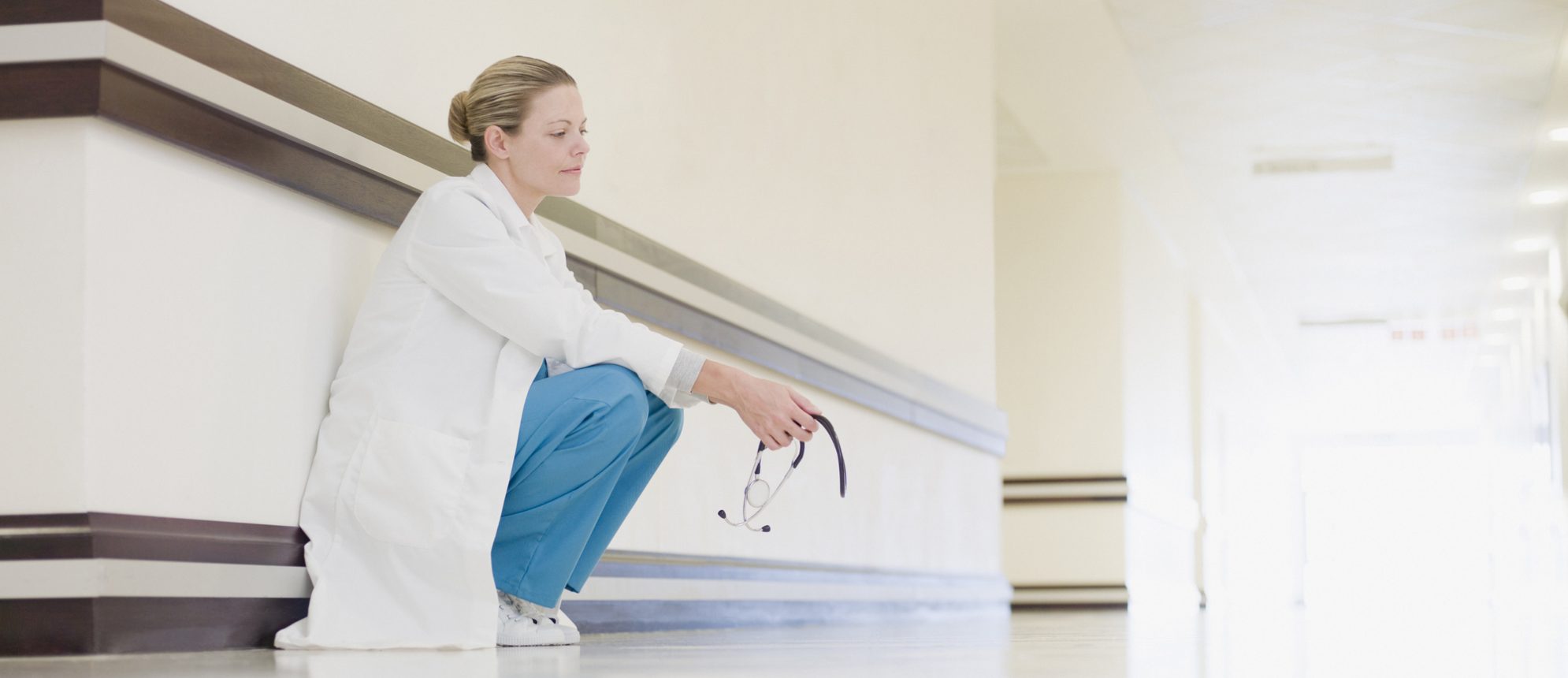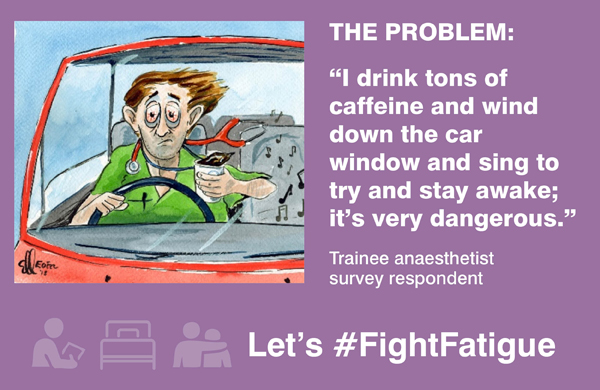
Using the power of social media to #FightFatigue in the NHS
Freshwater worked with the Association of Anaesthetists, and its partners the Royal College of Anaesthetists (RCoA) and the Faculty of Intensive Care Medicine (FICM), to deliver a high-impact, integrated campaign to raise awareness of the dangers of fatigue among NHS workers, and promote a series of practical resources to help tackle it.
The issue of fatigue was adopted by the partners after a trainee anaesthetist died while driving home tired after a nightshift. A membership survey of 2,231 junior anaesthetists – which underpinned the wider campaign – found that more than half had experienced an accident or near miss when driving home after a nightshift, and provided compelling evidence of an issue that had for too long, gone unaddressed.
Over a period of nine months, Freshwater worked with the three partner organisations to crystalise their message into a joint statement. We developed an integrated campaign plan and creative identity that would engage the target audience of NHS workers, senior leaders and policy makers and encourage organisations to adopt a set of educational resources.
Brief
Freshwater was asked by the Association of Anaesthetists to help to raise awareness of the widespread impact of fatigue on the NHS workforce and the subsequent consequences for staff wellbeing and patient safety. They also wanted to engage clinicians, NHS leaders and policy makers in conversation about the issue and encourage NHS Trusts and Health Boards to use educational resources designed to help tackle the issue. After a PR-led launch, Freshwater was asked to deliver an integrated campaign to build awareness in the run up to World Sleep Day the following year.
522%
increased reach of Facebook content compared to World Sleep Day 2017
176,417,475
opportunities to see from media including The Guardian and BBC
2,290
downloads of the educational resources and 9% increase in website traffic
Delivery
Freshwater translated the findings of a membership survey into a package for the media which included a press release, access to spokespeople, detailed statistics and quotes from junior doctors who had been directly affected by fatigue. We worked with The Guardian on an exclusive package for its health pages, before going on to engage a broad cohort of media including the BMJ, Pulse, the BBC and UK national newspapers to ensure good media penetration for the story.
The survey findings and news release were communicated to the Association’s membership through owned channels (predominately email newsletters) in advance of the media outreach. This was done to ensure that they – the people most affected by the issue – received the information first. It also meant that they were ready, and able, to amplify the findings, and overall message, on social media as the news broke. This added an important element of authenticity to the story.
Following the media launch, we worked with the Association, RCoA and FICM to create a stakeholder map and engagement strategy. We outlined who they needed to reach, and engage, in order to effect real change on the front-line of the NHS and build on the momentum of the news coverage. This included mapping key parliamentary figures and also leaders responsible for workforce, wellbeing and patient safety at a series of non-governmental departments.
A joint statement between the three initial organisations was to be the cornerstone of the wider campaign. Freshwater’s experienced consultants and copywriters worked with the Association, RCoA and FICM to develop a succinct statement clearly outlining their position on the issues caused by fatigue, detailing their proposed solutions and including a compelling call to action for how others could become involved in the work they were doing.
Having drafted the communications strategy, identified the key influencers and decision-makers and agreed the message, Freshwater developed a creative identity and name for the campaign – #FightFatigue. The campaign and launch of the joint statement would take place online, and be underpinned by the hashtag #FightFatigue that all three organisations had agreed to adopt.
Our team of content marketing specialists and graphic designers produced striking infographics, website banners and email communications in the run up to launch day, World Sleep Day.
Freshwater also created a unique branded Twibbon for users to display on their social media accounts in support of the campaign, designed banners for the Association’s Twitter and Facebook profiles, created organic social media content plans for both channels and monitored and managed social media responses on the launch day of the joint statement.
We commissioned a trainee anaesthetist to use anonymous comments from the membership survey on fatigue to create a series of illustrations that were used to enhance the organic social media content. These illustrations became a powerful, visual representation of situations that the target audience would relate to and elicited the highest number of replies on social media, often sparking debate. To drive the conversation further, key stakeholders and appropriate healthcare ‘influencers’ were tagged in posts, as well as being contacted via direct message to promote the campaign ahead of launch day.

Results
The recorded reach of Facebook content produced and managed by Freshwater for the campaign launch increased by 522% in comparison to World Sleep Day the previous year. On Twitter, recorded mentions of the Association increased by 57%, profile visits rose 73% and overall tweet impressions increased from 133,000 to 375,000, year-on-year.
Organic Twitter activity generated 764 retweets, 867 likes, 52 replies, 815 mentions and 8,076 profile visits. Ninety five per cent (95%) of the tweets containing the campaign hashtag were positive in sentiment and tone and #FightFatigue trended nationally in the UK on World Sleep Day. Facebook content drove 135 likes, eight comments and 39 shares and – combined with Twitter – we delivered 180,137 impressions in the week post-launch for campaign-related content.
Social media was responsible for driving the majority of the 5,616 visits to the campaign hub during launch, accounting for 2,055 visits with the remaining coming from email marketing (489) or organic search (849). Over 2,200 downloads of the educational resources were recorded during the seven days post-launch, pointing to the success of the call to action strategy. Half of all website visitors to the Association’s website in March landed on the campaign page.
Other key outcomes include a variety of high-profile organisations and individuals backing the campaign, including the Royal College of Midwives, the World Sleep Federation and Dr Tamal Ray (Great British Bake-off contestant and himself an anaesthetist). Twenty-eight NHS Trusts and Health Boards provided positive endorsement for the educational resources and a commitment to adopt them.
Public affairs activity to support the publication of the joint statement also secured a meeting with England’s Chief Medical Officer, Professor Dame Sally Davies, and set the foundation for an ongoing programme of engagement with senior decision and policy makers.
